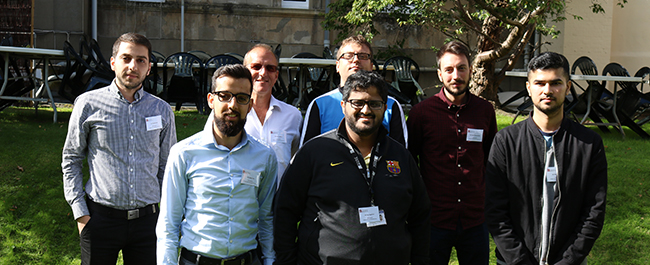2018 cohort.
| Name | Project Title | About | |
|---|---|---|---|
 |
Moonas Ahmad | Power amplifier architecture for mmWave communications | About |
 |
Faya Algahtani | Micro-*countermeasures for severely constrained IoT wireless embedded devices | About |
 |
Obada Alia | Physical layer network security for the future internet | About |
 |
Sebastian Kudera | Atmospheric ducting and over the horizon propagation | About |
 |
Sarmad Ozan | Frequency agile and resilient RF technologies | About |
 |
Ioannis Papoutsidakis | Towards massive, ultra reliable and low-latency wireless communications | About |
 |
Simon Wilson | Secure dynamic spectrum access | About |
Moonas Ahmad
Moonas graduated from University of Surrey in 2015 with a first class MEng in Electronic Engineering. He then joined the Centre for Doctoral Training (CDT) in Communications in 2018 and is currently studying in the first year of the programme.
"The CDT route provide great opportunity for recent graduates to gain knowledge of communications in the first year and builds a solid foundation in choosing your PhD project in the area of research that attracts and interests you."
Faya Algahtani
Faya has a BSc degree in Computer Engineering from King Saud University, Saudi Arabia. His graduate research was on the IEEE 802.11e EDCA Parameters Effects on Multimedia Performance. He is a teaching assistant at King Saud University on academic leave. He received an MSc degree in Electrical Engineering from University of Southern California, Los Angeles, CA, USA.
"I believe the cdt is a great program in that it prepares strengthen students background before embarking on their research journey."
Obada Alia
Obada graduated with a BEng degree in Electrical and Electronic Engineering from the University of Bristol in 2018. During his studying he had the opportunity to work with Sony (Semiconductor and Electronics Solution) as an intern in telecommunication and IoT solutions. He also worked with HPN (High Performance Networks) Group developing an IoT network.
"The CDT program is a very attractive program due to the fact that it combines both taught and research aspect of communication. The chance of applying what you learn in the research field to an actual industry or a product is a once in a life time, and the Challenge is accepted!!!"
Sebastian Kudera
Sebastian graduated from Nottingham Trent University in 2018 with an integrated Master's degree (MMath) in Mathematics.
"I hope that the CDT course will give me much more insight on the applications of Mathematics in the world around me. The foundation year allows a smooth transition from the field of Mathematics to Engineering."
Sarmad Ozan
Sarmad obtained an MSc in Wireless communications and signal processing from the University of Bristol after a BSc in computer and information engineering from Mosul University. He has joined the CDT with a view to undertake research in wireless communications.
“The CDT in Communications at the University of Bristol provides academic enhancement, research skills and industrial awareness through the available state-of the-art facilities and the industrial partners.”
Ioannis graduated with an integrated MEng in Electronic and Computer Engineering from Technical University of Crete in 2016. He continued his studies at the University of Crete and was awarded a MSc in Computer Networks and Telecommunications in 2018. During his postgraduate studies he worked as a guest researcher at the Foundation for Research and Technology-Hellas. His research interests include several aspects of information theory, either on communication schemes or other applications.
“The CDT in Communications provides the ideal researching environment for engineers, mathematicians, and experienced professionals. This mixture leads to development of cutting-edge technologies in which I am truly excited to be a part of.”
Simon Wilson
Simon has worked in the Communications industry for over 30 years having graduated from Brunel University with a first class honours degree in Electrical and Electronic Engineering. From 2001 to 2018 he was responsible for global Spectrum Policy in the Technology and Strategy teams of O2 and Telefonica. Prior to that Simon worked in the test & measurement, radio manufacturing and regulatory policy fields.
“I am looking forward to add academic depth and advanced research to my industrial experience. The University of Bristol's EPSRC Centre for Doctoral Training is the perfect environment to enable me to continue contributing to the future development of communications in the UK and beyond."
Research on film
Learn more about our research from current and past students, industrial collaborators and our academics
